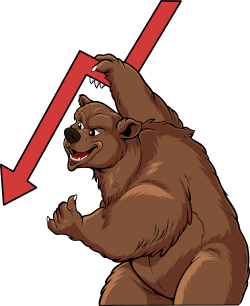MATMattel, Inc.
Company Overview
Name
52W High
52W Low
Market Cap
Dividend Yield
Price/earnings
P/E
Dividends
No dividend
Sentiment
Score
Mixed
50
Low
Neutral
High
0
50
100
Trade Volume
Score
Neutral
50
Low
Neutral
High
0
50
100
Income Statement
Total Revenue
Operating Revenue
Total Gross Profit
Total Operating Income
Net Income
EV to EBITDA
EV to Revenue
Price to Book value
Price to Earnings
Additional Data
Selling, General & Admin Expense
Marketing Expense
Total Operating Expenses
Interest Expense
Interest & Investment Income
Other Income / (Expense), net
Earnings History
Estimated EPS
Reported EPS
N/ACompany Overview
Name
52W High
52W Low
Market Cap
Dividend Yield
Price/earnings
P/E
Dividends
No dividend
Sentiment
Score
Mixed
50
Low
Neutral
High
0
50
100
Trade Volume
Score
Neutral
50
Low
Neutral
High
0
50
100
Income Statement
Total Revenue
Operating Revenue
Total Gross Profit
Total Operating Income
Net Income
EV to EBITDA
EV to Revenue
Price to Book value
Price to Earnings
Additional Data
Selling, General & Admin Expense
Marketing Expense
Total Operating Expenses
Interest Expense
Interest & Investment Income
Other Income / (Expense), net
Earnings History
Estimated EPS
Reported EPS
N/AUpcoming Earnings
Company Info
CEO
Ynon Kreiz
Location
N/A, N/A
Exchange
Nasdaq
Website
https://mattel.com
Summary
Mattel, Inc.
Company Info
CEO
Ynon Kreiz
Location
N/A, N/A
Exchange
Nasdaq
Website
https://mattel.com
Summary
Mattel, Inc.
Community Research
Research from investors like you
Be the first to share your analysis on MAT
Help fellow investors make informed decisions by sharing your research on fundamentals, catalysts, and outlook.
Symbol's posts
Market recap: Hot jobs report, earnings misses from Mattel and HOOD, and software stocks
Market recap: Hot jobs report, earnings misses from Mattel and HOOD, and software stocks
:max_bytes(150000):strip_icc()/GettyImages-2229461465-9128a43eb18340ec8df5197b2ef69351.jpg)
www.investopedia.com
| Stock Market Today: Futures Little Changed Ahead of Delayed January Jobs Report
tough day for Mattel
tough day for Mattel
i'm pretty shocked to see Mattel drop over 30% today after those earnings forecasts. it seems like is really struggling with inventory and low holiday demand. do you guys think this is just a temporary dip or is the whole toy industry in trouble?
Earnings recap: Spotify and Datadog beat, Mattel and Lyft tank
Earnings recap: Spotify and Datadog beat, Mattel and Lyft tank
finance.yahoo.com
| Earnings live: Lyft stock tanks on operating loss, Mattel stock crashes, Robinhood falls, Ford rises
Analyst take on Rigetti vs IBM for quantum computing plays
Analyst take on Rigetti vs IBM for quantum computing plays

finance.yahoo.com
| Forget Rigetti Computing, This Established AI Giant Is a Safer Play
Supreme Court ruling on tariffs expected Wednesday, potential market reaction
Supreme Court ruling on tariffs expected Wednesday, potential market reaction

www.fool.com
| Prediction: The Stock Market Will Soar on Wednesday If This Happens | The Motley Fool
Barbie Movie Boost?
Barbie Movie Boost?
reports earnings today for the first time since the release of the Barbie movie (best movie of 2023 btw). Are we going to see a big jump or is this already priced in?
No more topics to show








